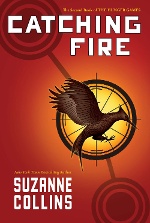
Find more great Horn Book content at these links:
Recommended books: reviews and themed booklists
App and e-book reviews
Movie reviews
Event news and recaps
Events calendar
Second Book Syndrome: In Defense of Second Books
Second book syndrome. As readers, we’ve all heard of it and even diagnosed some books we’ve read with it...I have often heard people say they aren’t going to continue a series because of their dislike for the second book, or that they would like to just forget the second book even happened. I happen to be on the other side of this argument – I’m a huge fan of second books in a series.
Second book syndrome. As readers, we’ve all heard of it and even diagnosed some books we’ve read with it. After loving an author's first book, we might not find that their second book lives up to our expectations (or the hype). I’ve found this is especially true with series. Book one introduces readers to a captivating world they are eager follow, only to be disappointed by book two. I have often heard people say they aren’t going to continue a series because of their dislike for the second book, or that they would like to just forget the second book even happened. I myself am on the other side of this argument – I’m a huge fan of second books in a series.
 When asked the question, “What’s your favorite book?” my go-to answer is Catching Fire by Suzanne Collins. This usually gets me a funny look or a confused response. The reason behind my answer is that I find it the most important for the trilogy’s story line. The Hunger Games establishes Panem as a deadly and terrifying futuristic world struck by overpopulation and introduces the important characters and their relationships, but everything is elevated in book two. Katniss gets sent back to the Hunger Games, she grapples with her “relationship” with Peeta, and the revolution’s spark officially catches fire (see what I did there?). These are all crucial developments in Collins’s trilogy and they deepen everything that will come next in the story.
When asked the question, “What’s your favorite book?” my go-to answer is Catching Fire by Suzanne Collins. This usually gets me a funny look or a confused response. The reason behind my answer is that I find it the most important for the trilogy’s story line. The Hunger Games establishes Panem as a deadly and terrifying futuristic world struck by overpopulation and introduces the important characters and their relationships, but everything is elevated in book two. Katniss gets sent back to the Hunger Games, she grapples with her “relationship” with Peeta, and the revolution’s spark officially catches fire (see what I did there?). These are all crucial developments in Collins’s trilogy and they deepen everything that will come next in the story.
 Tahereh Mafi’s Unravel Me is just as important to me. The sequel to Shatter Me continues the relationship Juliette has (or doesn’t have) with Warner and initiates a rebellion against The Reestablishment. Though I understand why some might say that Unravel Me suffers from second book syndrome due to the redemption arc of Warner’s character, there are a fair number of people who love him by the end. Without Unravel Me, Warner would most likely remain a villain, and there would be no answers about the powers that many of the characters possess.
Tahereh Mafi’s Unravel Me is just as important to me. The sequel to Shatter Me continues the relationship Juliette has (or doesn’t have) with Warner and initiates a rebellion against The Reestablishment. Though I understand why some might say that Unravel Me suffers from second book syndrome due to the redemption arc of Warner’s character, there are a fair number of people who love him by the end. Without Unravel Me, Warner would most likely remain a villain, and there would be no answers about the powers that many of the characters possess.
Even much longer series don’t suffer from second book syndrome in my eyes. Marissa Meyer’s Scarlet, book two of the Lunar Chronicles, introduces the most badass character of the entire series and develops the beginnings of the ultimate female alliance. Crown of Midnight, the sequel to Sarah J. Maas’s Throne of Glass, progresses Celaena’s friendship with Princess Nehemia and explores the possibility of a relationship with Crown Prince Dorian. And how could I forget J. K. Rowling’s Harry Potter and the Chamber of Secrets? A childhood favorite of mine, Chamber of Secrets continues to be my best-loved book and movie of the entire Harry Potter series. Readers finally become aware of Harry’s similarities with Voldemort, a story line that only grows in power and detail throughout the next five books.



Even if you, like many readers, hate the second book in a series, it can be incredibly integral to the overall story arc. Though an author may throw in a new romance or even take the story in a whole new direction, an immense amount of important groundwork can be laid. Think about how important those details may be to the series as a whole the next time you might be tempted to dismiss a second book.

RELATED
ALREADY A SUBSCRIBER? LOG IN
We are currently offering this content for free. Sign up now to activate your personal profile, where you can save articles for future viewing.







Add Comment :-
Be the first reader to comment.
Comment Policy:
Comment should not be empty !!!